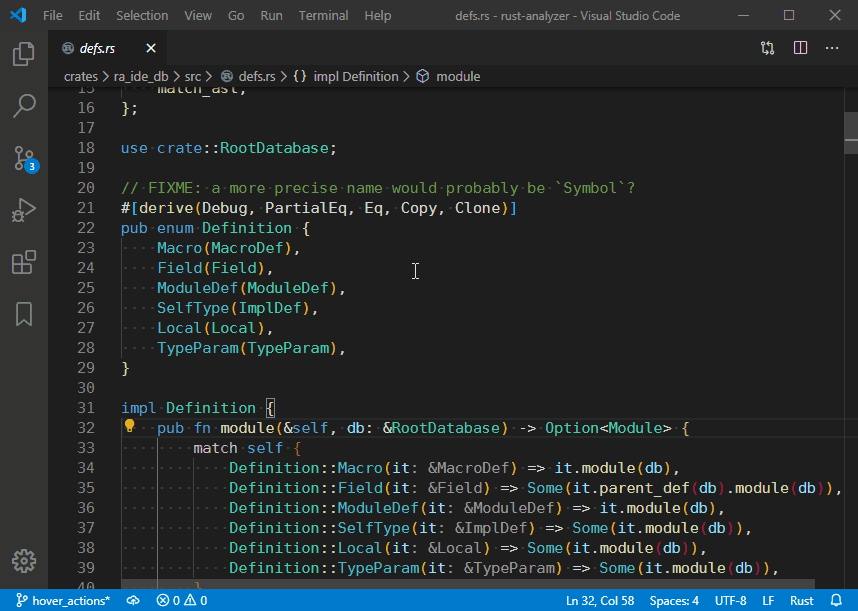4689: Implement return position impl trait / opaque type support r=matklad a=flodiebold
This is working, but I'm not that happy with how the lowering works. We might need an additional representation between `TypeRef` and `Ty` where names are resolved and `impl Trait` bounds are separated out, but things like inference variables don't exist and `impl Trait` is always represented the same way.
Also note that this doesn't implement correct handling of RPIT *inside* the function (which involves turning the `impl Trait`s into variables and creating obligations for them). That intermediate representation might help there as well.
Co-authored-by: Florian Diebold <flodiebold@gmail.com>
Co-authored-by: Florian Diebold <florian.diebold@freiheit.com>
4729: Hover actions r=matklad a=vsrs
This PR adds a `hoverActions` LSP extension and a `Go to Implementations` action as an example:

4748: Add an `ImportMap` and use it to resolve item paths in `find_path` r=matklad a=jonas-schievink
Removes the "go faster" queries I added in https://github.com/rust-analyzer/rust-analyzer/pull/4501 and https://github.com/rust-analyzer/rust-analyzer/pull/4506. I've checked this PR on the rustc code base and the assists are still fast.
This should fix https://github.com/rust-analyzer/rust-analyzer/issues/4515.
Note that this does introduce a change in behavior: We now always refer to items defined in external crates using paths through the external crate. Previously we could also use a local path (if for example the extern crate was reexported locally), as seen in the changed test. If that is undesired I can fix that, but the test didn't say why the previous behavior would be preferable.
Co-authored-by: vsrs <vit@conrlab.com>
Co-authored-by: Jonas Schievink <jonasschievink@gmail.com>
Co-authored-by: Jonas Schievink <jonas.schievink@ferrous-systems.com>
The idea behind requiring the label is a noble one, but we are not
really using it consistently anyway, and it should be easy to retrofit
later, should we need it.
4269: add support of use alias semantic in definition r=matklad a=bnjjj
close#4202
4293: no doctests for flycheck r=matklad a=matklad
bors r+
🤖
Co-authored-by: Benjamin Coenen <5719034+bnjjj@users.noreply.github.com>
Co-authored-by: Aleksey Kladov <aleksey.kladov@gmail.com>
It improves compile time in `--release` mode quite a bit, it doesn't
really slow things down and, conceptually, it seems closer to what we
want the physical architecture to look like (we don't want to
monomorphise EVERYTHING in a single leaf crate).
3549: Implement env! macro r=matklad a=edwin0cheng
This PR implements `env!` macro by adding following things:
1. Added `additional_outdirs` settings in vscode. (naming to be bikeshed)
2. Added `ExternSourceId` which is a wrapping for SourceRootId but only used in extern sources. It is because `OUT_DIR` is not belonged to any crate and we have to access it behind an `AstDatabase`.
3. This PR does not implement the `OUT_DIR` parsing from `cargo check`. I don't have general design about this, @kiljacken could we reuse some cargo watch code for that ?
~~Block on [#3536]~~
PS: After this PR , we (kind of) completed the `include!(concat!(env!('OUT_DIR'), "foo.rs")` macro call combo. [Exodia Obliterate!](https://www.youtube.com/watch?v=RfqNH3FoGi0)
Co-authored-by: Edwin Cheng <edwin0cheng@gmail.com>
3542: Renames work on struct field shorthands r=matklad a=m-n
When renaming either a local or a struct field, struct field shorthands are now renamed correctly.
Happy to refactor this if it doesn't fit the design of the code. Thanks for adding the suggestion of where to start on the issue.
I wasn't sure if I should also look at the behavior of renaming when placing the cursor at the field shorthand; the following describes the behavior with this patch:
```rust
#[test]
fn test_rename_field_shorthand_for_unspecified() {
// when renaming a shorthand, should we have a way to specify
// between renaming the field and the local?
//
// If not is this the correct default?
test_rename(
r#"
struct Foo {
i: i32,
}
impl Foo {
fn new(i: i32) -> Self {
Self { i<|> }
}
}
"#,
"j",
r#"
struct Foo {
i: i32,
}
impl Foo {
fn new(j: i32) -> Self {
Self { i: j }
}
}
"#,
);
}
```
Resolves#3431
Co-authored-by: Matt Niemeir <matt.niemeir@gmail.com>
This introduces the new type -- Semantics.
Semantics maps SyntaxNodes to various semantic info, such as type,
name resolution or macro expansions.
To do so, Semantics maintains a HashMap which maps every node it saw
to the file from which the node originated. This is enough to get all
the necessary hir bits just from syntax.